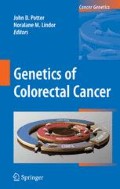Access this chapter
Tax calculation will be finalised at checkout
Purchases are for personal use only
References
Birch, J. M., A. L. Hartley, et al. (1994). “Prevalence and diversity of constitutional mutations in the p53 gene among 21 Li–Fraumeni families.”Cancer Res 54(5): 1298–304.
Birch, J. M., V. Blair, et al. (1998). “Cancer phenotype correlates with constitutional TP53 genotype in families with the Li–Fraumeni syndrome.”Oncogene 17(9): 1061–8.
Bougeard, G., L. Brugieres, et al. (2003). “Screening for TP53 rearrangements in families with the Li–Fraumeni syndrome reveals a complete deletion of the TP53 gene.”Oncogene 22(6): 840–6.
Fisher, D. E. (2001). “The p53 tumor suppressor: critical regulator of life & death in cancer.”Apoptosis 6(1–2): 7–15.
Garber, J. E., A. M. Goldstein, et al. (1991). “Follow-up study of twenty-four families with Li–Fraumeni syndrome.”Cancer Res 51(22): 6094–7.
Hisada, M., J. E. Garber, et al. (1998). “Multiple primary cancers in families with Li–Fraumeni syndrome.”J Natl Cancer Inst 90(8): 606–11.
Hwang, S. J., G. Lozano, et al. (2003). “Germline p53 mutations in a cohort with childhood sarcoma: sex differences in cancer risk.”Am J Hum Genet 72(4): 975–83.
Kleihues, P., B. Schauble, et al. (1997). “Tumors associated with p53 germline mutations: a synopsis of 91 families.”Am J Pathol 150(1): 1–13.
Lane, D. P. (1992). “Cancer. p53, guardian of the genome.”Nature358(6381): 15–6.
Levine, A. J. (1997). “p53, the cellular gatekeeper for growth and division.”Cell 88(3): 323–31.
Li, F. P. and J. F. Fraumeni, Jr. (1969). “Soft-tissue sarcomas, breast cancer, and other neoplasms. A familial syndrome?”Ann Intern Med 71(4): 747–52.
Lynch, H. T. and A. de la Chapelle (1999). “Genetic susceptibility to non-polyposis colorectal cancer.”J Med Genet 36(11): 801–18.
Lynch, H. T. and A. de la Chapelle (2003). “Hereditary colorectal cancer.”N Engl J Med 348(10): 919–32.
Malkin, D., F. P. Li, et al. (1990). “Germ line p53 mutations in a familial syndrome of breast cancer, sarcomas, and other neoplasms.”Science 250(4985): 1233–8.
Nichols, K. E., D. Malkin, et al. (2001). “Germ-line p53 mutations predispose to a wide spectrum of early-onset cancers.”Cancer Epidemiol Biomarkers Prev 10(2): 83–7.
Olivier, M., D. E. Goldgar, et al. (2003). “Li–Fraumeni and related syndromes: correlation between tumor type, family structure, and TP53 genotype.”Cancer Res 63(20): 6643–50.
Varley, J. M., G. McGown, et al. (1995). “An extended Li–Fraumeni kindred with gastric carcinoma and a codon 175 mutation in TP53.”J Med Genet 32(12): 942–5.
Varley, J. M., D. G. Evans, et al. (1997). “Li–Fraumeni syndrome – a molecular and clinical review.”Br J Cancer 76(1): 1–14.
Walsh, T., S. Casadei, et al. (2006). “Spectrum of mutations in BRCA1, BRCA2, CHEK2, and TP53 in families at high risk of breast cancer.”JAMA 295(12): 1379–88.
Wong, P., S. J. Verselis, et al. (2006). “Prevalence of early onset colorectal cancer in 397 patients with classic Li–Fraumeni syndrome.”Gastroenterology 130(1): 73–9.
Author information
Authors and Affiliations
Corresponding author
Editor information
Editors and Affiliations
Rights and permissions
Copyright information
© 2009 Springer Science + Business Media, LLC
About this chapter
Cite this chapter
Masciari, S., Syngal, S. (2009). The Role of p53 in Colorectal Cancer. In: Potter, J.D., Lindor, N.M. (eds) Genetics of Colorectal Cancer. Cancer Genetics. Springer, New York, NY. https://doi.org/10.1007/978-0-387-09568-4_14
Download citation
DOI: https://doi.org/10.1007/978-0-387-09568-4_14
Publisher Name: Springer, New York, NY
Print ISBN: 978-0-387-09567-7
Online ISBN: 978-0-387-09568-4
eBook Packages: Biomedical and Life SciencesBiomedical and Life Sciences (R0)

